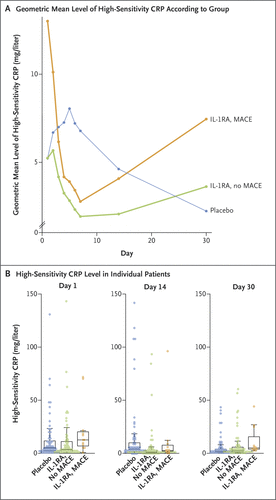当前位置:
X-MOL 学术
›
N. Engl. J. Med.
›
论文详情
Our official English website, www.x-mol.net, welcomes your
feedback! (Note: you will need to create a separate account there.)
Canakinumab for Atherosclerotic Disease
The New England Journal of Medicine ( IF 96.2 ) Pub Date : 2018-01-10 , DOI: 10.1056/nejmc1714635 Alexander M Rothman 1 , Allison C Morton 2 , David C Crossman 3 ,
The New England Journal of Medicine ( IF 96.2 ) Pub Date : 2018-01-10 , DOI: 10.1056/nejmc1714635 Alexander M Rothman 1 , Allison C Morton 2 , David C Crossman 3 ,
Affiliation

|
To the Editor: Ridker et al. (Sept. 21 issue)1 found in the Canakinumab Antiinflammatory Thrombosis Outcome Study (CANTOS) that reduced inflammation was associated with reduced cardiovascular risk. Unfortunately, the opportunity to identify the precise point of action of canakinumab has not been exploited in this trial. 18F-fluorodeoxyglucose (FDG) positron emission tomography (PET) is a validated molecular imaging technique that is widely used to noninvasively quantify plaque inflammation during treatment with therapeutic agents targeted at reducing atherosclerotic inflammation.2 Inflammatory activity that is detected by PET positively correlates with intraplaque macrophage infiltration.3 This trial could have used PET to verify that the . . .
中文翻译:

卡那奴单抗治疗动脉粥样硬化疾病
致编辑:Ridker 等人。(9 月 21 日)1 Canakinumab 抗炎血栓形成结果研究 (CANTOS) 发现,炎症减少与心血管风险降低相关。不幸的是,该试验尚未利用确定卡那奴单抗精确作用点的机会。18F-氟脱氧葡萄糖 (FDG) 正电子发射断层扫描 (PET) 是一种经过验证的分子成像技术,广泛用于在使用旨在减少动脉粥样硬化炎症的治疗药物治疗期间对斑块炎症进行无创量化。2 PET 检测到的炎症活动与斑块内呈正相关。巨噬细胞浸润。3 该试验可以使用 PET 来验证。。。
更新日期:2018-01-10
中文翻译:

卡那奴单抗治疗动脉粥样硬化疾病
致编辑:Ridker 等人。(9 月 21 日)1 Canakinumab 抗炎血栓形成结果研究 (CANTOS) 发现,炎症减少与心血管风险降低相关。不幸的是,该试验尚未利用确定卡那奴单抗精确作用点的机会。18F-氟脱氧葡萄糖 (FDG) 正电子发射断层扫描 (PET) 是一种经过验证的分子成像技术,广泛用于在使用旨在减少动脉粥样硬化炎症的治疗药物治疗期间对斑块炎症进行无创量化。2 PET 检测到的炎症活动与斑块内呈正相关。巨噬细胞浸润。3 该试验可以使用 PET 来验证。。。











































 京公网安备 11010802027423号
京公网安备 11010802027423号